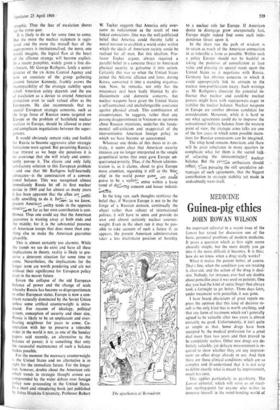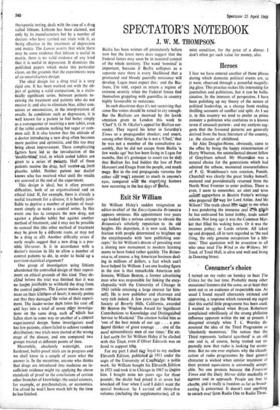Guinea-pig ethics
MEDICINE JOHN ROWAN WILSON
An important editorial in a recent issue of the Lancet has raised for discussion one of the basic, perennial problems of modern medicine. It poses a question which at first sight seems absurdly simple, but the more deeply you go into it the more difficult it becomes. It is this: how do we know when a drug really works?
When it makes the patient better, of course. That's fine, when the condition you are treating is clear-cut, and the action of the drug is deci- sive. Nobody, for instance, ever had any doubts about penicillin once it was used on patients. One day you had the kind of septic finger that always took a fortnight to get better. Three days later, under treatment with penicillin, it was gone.
I have heard physicians of great repute ex- press the opinion that this kind of decisive re- sult is the only kind that is worth anything, and that any form of treatment which isn't generally agreed to be valuable after two years is almost certainly no good. Unfortunately, it isn't quite as simple as that. Some drugs have been accepted by the medical profession for a great deal more than two years and then proved to be completely useless. Other new drugs are de- finitely valuable, yet delicate measurement is re- quired to show whether they are any improve- ment on other drugs already in use. And then there are those clinical conditions which are so complex and ill-understood that it is not easy to define exactly what is meant by improvement, much less cure.
This applies particularly to pyschiatry. The Lancet editorial, which will serve as an excel- lent starting-point for anyone who wishes to immerse himself in the mind-bending world of therapeutic testing, deals with the case of a drug called lithium. Lithium has been claimed, not only by its manufacturers but by a number of doctors who have carried out trials with it, as being effective in the treatment of depression and mania. The Lancet asserts that while there may be some evidence that lithium is useful in mania, there is no valid evidence of any kind that it is useful in depression. It dismisses the published papers which make this particular claim, on the grounds that the experiments were of an unsatisfactory design. The ideal design for a drug trial is a very rigid one. It has been worked out with the ob- ject of gaining a valid comparison, in a statis- tically significant series, between patients re- ceiving the treatment and patients who do not receive it; and also to eliminate bias, either con- scious or unconscious, in the interpretation of results. In conditions such as depression, it is well known for a patient to feel better simply as a consequence of receiving a new tablet, even if the tablet contains nothing but sugar or com- mon salt. It is also known that the attitude of a doctor introducing a new drug often becomes more positive and optimistic, and this too may bring about improvement. These complicating fLctors have led to the introduction of the Votible-blind:_trial, in which coded tablets are given to a series IA -pstients. Half of these patients receive the drug, half receivs-aa inert placebo tablet. Neither patient nor doctors knows who has received what until the results are assessed at the end of the experiment. This design is ideal, but it often presents difficulties, both of an organisational and an ethical kind. If, for example, there is already a useful treatment for a disease, it is hardly justi- fiable to deprive a number of patients of treat- ment simply to make a control series. In this event one has to compare the new drug, not against a placebo tablet but against another method of treatment, and it may not be possible to conceal this (the other method of treatment may be given by a different route, or may not be a drug at all). Another difficulty arises if early resolts suggest that a new drug is a pos- sible life-saver. Is it in accordance with a • doctor's mission in life to allow a number of control patients to die, in order to build up a cast-iron statistical argument? One group of investigators using lithium abandoned the controlled design of their experi- ment on ethical grounds of this kind. They de- cided before the trial was finished that it was no longer justifiable to withhold the drug from the control patients. The Lancet makes no com- ment on their kfriduess of heart; it merely points out that they damaged the value of their experi- ment. The leader-writer that takes his coat off and lays into a total of seven ether investiga- tions on the same drug, each or -which has fallen short in some way or another of a c'Oefect experimental design. Some investigators used too few patients, others failed to achieve random distribution; two trials were started at the wrong stage of the disease, and one compared two groups treated at different points of time. Meanwhile, absolutely watertight, case- hardened, bullet-proof trials are in progress and we shall know in a couple of years what the answer is. In the meantime, anyone who thinks that drugs are introduced into medicine on in- sufficient evidence might try applying the above standards of proof to the conclusions of certain other branches of knowledge; the social sciences, for example, or psychoanalysis, or economics. I'm afraid be won't have much left by the time he has finished.











































 Previous page
Previous page